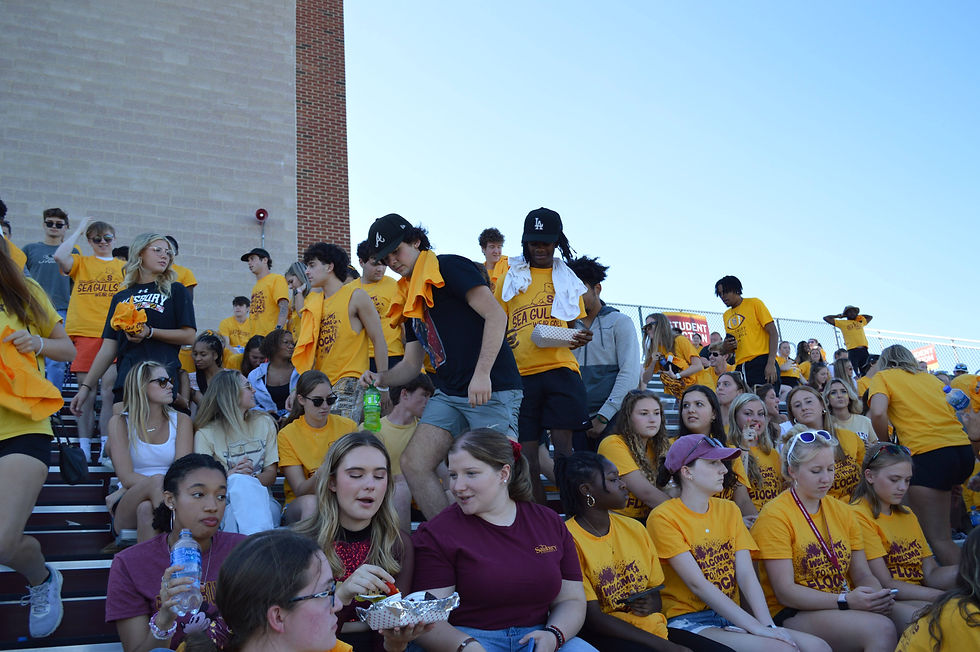SU students experience a powwow, broaden cultural understanding
- Colin McEvers

- Sep 14, 2023
- 3 min read

Dancers in the arena on the way out to take a break at the end of a dance. Image courtesy of Maddie Wade.
Over the weekend, SU students studying social work went on a field trip to a Nanticoke Indian powwow in Delaware, where they were able to get a glimpse of Native American culture.
Within the hundreds of indigenous tribes throughout this country, powwows are a crucial aspect of the culture in which tribal members celebrate their ancestral history by singing, dancing and reconnecting with loved ones.
Most of the students who embarked on this trip never had the firsthand experience of going to a powwow, meaning there was an opportunity to gain a greater sense of cultural understanding.
In the field of social work, professionals conduct research, advocate for improved services and assist families experiencing domestic issues. Many social workers tend to serve a specific population, which is why exposure to different groups is essential.
Sabrina Wilt, an SU student majoring in social work whose future goal is to assist children in need of help, went to the powwow to learn more about how people from diverse backgrounds approach life.
“I think it [the powwow] will help me learn more about other communities and the way people live, and [with] trying to find new ways to help people. Different kids have different needs and wants,” Wilt said.
Not only students majoring in social work were invited to partake in the field trip. There were also a few political science majors present, such as Lauren Gray, who seeks to better understand the areas of the social world to which she can offer assistance.
“It definitely brought into my view the different types of people I can help,” Gray said, referring to the powwow. “I thought all the cultures coming around were pretty cool.”
At a powwow both the singers and dancers are intrinsic parts of the ceremony, as they employ their talents for the purpose of telling stories that center on war, religion, or society.
Herman Jackson, a 71 year old Nanticoke dancer at the powwow clothed in vibrant Native attire, has been dancing at these gatherings since his retirement. Lately, Jackson has been to powwows held at the University of Delaware, the Delaware Art Museum and several other locations.

Herman Jackson, 71 year old Nanticoke dancer, was a noticeable presence at the Sep. 9th powwow. Image courtesy of Maddie Wade.
“We’re all family, we go to powwows together, it’s like a big reunion for us. We also put it on to raise money because we’ve got a museum, a center and employees, so we need funding to maintain everything and this is a big fundraiser for the whole year,” Jackson said.
Possibly the most vital reason for this field trip is the immense significance which cultural awareness has in the field of social work.
Dr. Greene, an SU social work professor who went on the trip, understands how significant a broader cultural perspective is to both social work and society as a whole.
“I think this [the trip] is a unique opportunity to experience something right in our backyards, close to home [and] close to school. Indigenous American cultures tend to be overlooked largely in social work as a profession. We can go and really learn about something that we might not have any information or misguided information about,” Greene said.

Dozens of people watching from the outskirts of the arena enjoy an ongoing dance and song. Image courtesy of Maddie Wade.
Although not an explicit factor in the purpose for the trip, the dire societal conditions which many Indigenous communities face is imperative to consider when exploring the field of social work.
Native American communities are burdened with rates of poverty, suicide, alcoholism, homicide, abuse, and homelessness that are higher than those of most ethnic groups within America, an unfortunate yet well-documented fact.
Finding solutions to these issues are bound to be extremely challenging, most likely requiring social workers and other professionals with a broad understanding of Native American cultures, traditions, and ways of life. This is why SU field trips to events like the Nanticoke powwow are so important.
SOURCES
National Association of Social Work: https://www.socialworkers.org/news/facts/types-of-social-work
AmericanAddictionCenters: https://americanaddictioncenters.org/alcoholism-treatment/native-americans
PowWows.com
National Library of Medicine: https://www.ncbi.nlm.nih.gov/pmc/articles/PMC2567901/
By COLIN MCEVERS
Office Manager
Featured images courtesy of Maddie Wade.





Comments